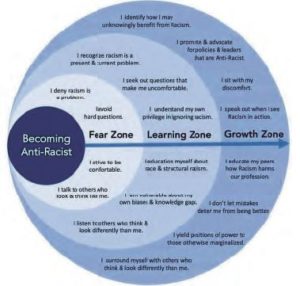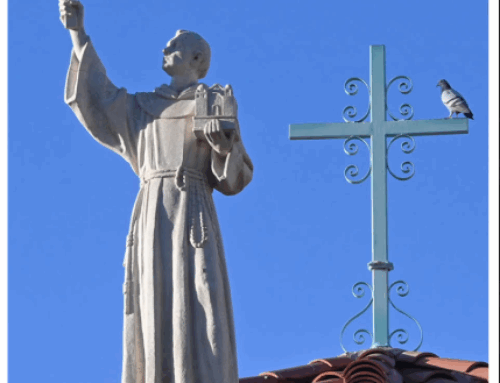(This article originally appeared in the Fall 2020 TAU-USA Magazine Issue #101)

RACISM–WHAT’S A SECULAR FRANCISCAN TO DO?
Mother Cabrini OFS Region Newsletter Submission, August 2020
Justice, Peace, and Integrity of Creation (JPIC)
The national OFS fraternity has asked us:
- to identify and eradicate the structures that perpetuate racism…
- to pray for an end to racism…
- to identify and confront our own unconscious racial biases.
I hope this article provides some resources for each of these actions that you can use individually or as a fraternity for on-going formation. It is not comprehensive, but rather offers a menu of ideas.
Warning: Expect to be uneasy when you ponder and grapple with issues of race. Racism in the U.S. is an uncomfortable truth, experienced differently by us all. For some, it is a passing thought, brought to mind by occasional news events. For others, it is real each time they walk out the door. Some are blind to how they silently participate or reap its benefits, while others see their role with crystal clarity. When we discuss racism, our very image of ourselves and our participation comes into question, which is not easy. Have hope! As penitents, Secular Franciscans are used to on-going conversion and the discomfort it brings as the Spirit leads us to new places!
First, a Prayer to Overcome Racism
On August 2, 2020, we celebrated the Feast of Our Lady of the Angels of the Portiuncula, so it is fitting that we ask the Blessed Mother’s assistance in our journey of confronting racism.[1]
- “Mary, friend and mother to all, through your Son, God has found a way to unite himself to every human being, called to be one people, sisters and brothers to each other.
- We ask for your help in calling on your Son, seeking forgiveness for the times when we have failed to love and respect one another.
- We ask for your help in obtaining from your Son the grace we need to overcome the evil of racism and to build a just society.
- We ask for your help in following your Son, so that prejudice and animosity will no longer infect our minds or hearts but will be replaced with a love that respects the dignity of each person.
- Mother of the Church, the Spirit of your Son Jesus warms our hearts: pray for us.”
Second – The Rule: A Starting Point for Secular Franciscans
There are many instances of Scripture and Catholic Social Teaching that confront racism, but a shortcut is to look at The Rule. Taking a stand is not only the realm of politics – it is in the realm of faith, too.
- Rule Article 13b. As the Father sees in every person the features of his Son, the firstborn of many brothers and sisters, so the Secular Franciscans with a gentle and courteous spirit accept all people as a gift of the Lord and an image of Christ.
- Rule Article 15. Let them individually and collectively be in the forefront in promoting justice by the testimony of their human lives and their courageous initiatives. Especially in the field of public life, they should make definite choices in harmony with their faith.
Third – Identifying Systemic Racism Through Definitions and Videos
Each of us can work on our own attitudes and actions to not be racist, but to make real change “in the field of public life” we need to work on the structures of racism and how we unconsciously contribute to or benefit from them.
Definitions: The OFS-USA JPIC Animator Notes – Special Edition – Carolyn Townes, OFS from June 2020 offers some useful definitions. Suggestion: walk with the Spirt a bit if any of these terms make you feel uncomfortable.
- “Racism is defined as prejudice, discrimination, or antagonism directed against someone of a different race based on the belief that one’s own race is superior.
- Institutional racism (also known as systemic racism) is a form of racism expressed in the practice of social and political institutions. It is reflected in disparities regarding wealth, income, criminal justice, employment, housing, health care, political power and education, among other factors.
- White privilege or white-skinned privilege are the inherent advantages possessed by a white person on the basis of their race in a society characterized by racial inequality and injustice. It also refers to societal privilege that benefits white people over non-white people in some societies, particularly if they are otherwise under the same social, political, or economic circumstances.
- The phrase “Black Lives Matter” (BLM) can refer to the social movement, the organization, or the message. When someone refers to BLM, make sure you know which one they are referring to. Note: Many people agree with the message without belonging to the organization or supporting the movement.
- The social movement was founded in 2013 after the acquittal of George Zimmerman in the shooting death of African-American teen Trayvon Martin in February 2012. The movement became nationally recognized for street demonstrations following the 2014 deaths of two African Americans: Eric Garner in New York City and Michael Brown in Ferguson, Missouri.
- Black Lives Matter Foundation, Inc. is a global organization in the US, UK, and Canada, whose mission is to eradicate white supremacy and build local power to intervene in violence inflicted on Black communities by the state and vigilantes.
- The message, represented by the hashtag (#blacklivesmatter), is used at demonstrations, rallies and on social media to reaffirm that Black lives are just as sacred, valued and loved by God.
- And yes, all lives matter. However, all lives do not matter when Black lives do not matter.
Video: “Let’s Get to the Root of Racial Injustice,” Prof. Megan Ming Francis, TEDx Rainier, (19.5 minutes) https://www.youtube.com/watch?v=-aCn72iXO9s (Note: if you can’t access the video links directly, you can search YouTube for the titles.)
Description: This personable explanation from an African American professor uses the Ted Talk format and her own stories to reframe how we think of racism. It moves from thinking of racism as a few “bad apples” to the knowledge of how the “whole tree” is infected and calls for a new approach that goes beyond focusing only on education or policing. Note: I think her language and style will appeal to Franciscans!
Video: Systemic Racism Explained (4.5 minutes) https://www.youtube.com/watch?v=YrHIQIO_bdQ
Description: This short education cartoon explains what is meant by systemic racism, using the example of a white and a black student. It touches on schools, universities, housing, banking, incarceration, jobs, and implicit bias.
Video: “The Unequal Opportunity Race” (4 minutes) https://www.youtube.com/watch?v=vX_Vzl-r8NY
Description: This brief cartoon uses the analogy of a footrace, with some contestants held back by systemic racism while other run more easily and accumulate wealth and prosperity.

Finally – Confronting Our Own Unconscious Racial Bias
I have not met a Franciscan who thinks they are a racist. The very thought of it is threatening. Yet we all carry unconscious biases based on our upbringing, where we get our news, personal experiences, gut-feelings, etc. The graphic below of concentric circles fits nicely with our approach of on-going conversion. What behaviors match our Franciscan approach to life? What circles do you sit in right now? Is your vocation calling you to move to another circle or act on one or more items?
Note: The original of this graphic can be found at: h6ps://www.surgeryredesign.com/ It is by Andrew M. Ibrahim, MD, MSc based on the work of Dr. Ibram Kendi. Permission has been given to use, copy and share.
[1] Source: © 2020 OFS-USA JPIC Animator Notes – Special Edition – Carolyn Townes, OFS


Leave A Comment